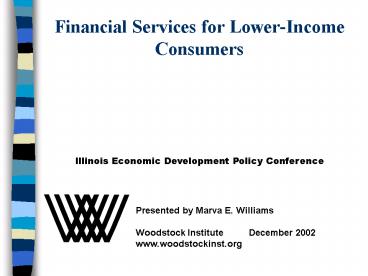Financial Services for LowerIncome Consumers - PowerPoint PPT Presentation
1 / 23
Title:
Financial Services for LowerIncome Consumers
Description:
Woodstock Institute December 2002. www.woodstockinst.org ... Public Policy and Advocacy Groups (Woodstock Institute, Legal Assistance Foundation) ... – PowerPoint PPT presentation
Number of Views:48
Avg rating:3.0/5.0
Title: Financial Services for LowerIncome Consumers
1
Financial Services for Lower-Income Consumers
Illinois Economic Development Policy Conference
Presented by Marva E. Williams Woodstock
Institute December 2002
www.woodstockinst.org
2
Woodstock Institute
- Founded in 1973
- Works locally and nationally to promote sound
community
reinvestment and economic development in
lower-income and minority communities - Collaborates with community organizations,
financial institutions, foundations,
government agencies, and others to promote its
goals - Engages in applied research, policy analysis,
technical assistance, public education, and
program design and evaluation - Areas of expertise CRA and fair lending
policies, financial and insurance services, small
business lending, community development financial
institutions, and economic development strategies
3
Chicago CRA Coalition
- Dozens of Chicago-area community groups
- Engages banks and regulators to increase bank
lending, services and investments in under-served
communities - Negotiates bank agreements
- Comments on reinvestment policy
4
Asset Building Program Areas
- Community Development Finance
- Lifeline Banking
- Predatory Loan Reform
5
Recent Accomplishments
- Reform Predatory Lending
- Advocate Financial Services for Lower-Income
Consumers - Promote Community Development Finance
6
Reform Predatory Lending
- Passage of strong anti-predatory mortgage lending
and payday lending regulations in Illinois - Ended payday loan partnership of Brickyard Bank
- Protested the proposed acquisition of Bank of
Kenney by payday lender - Monitored implementation of new regulations
- Developed alternative payday and subprime loan
products
7
Advocate Financial Services for Lower-Income
Consumers
- Examined whether mainstream credit unions service
lower-income consumers - Released survey of lowest cost checking account
product(s) of 75 Chicago area banks
8
Promote Community Development Finance
- Agreements with three major financial
institutions - Advocated for an increase in state and federal
resources for community development financial
institutions (CDFIs) - Proposed strategies to strengthen the Home
Mortgage Disclosure Act (HMDA) and Community
Reinvestment Act (CRA) - Published 17th edition of the Community Lending
Fact Book
9
The Credit Path The Path of Opportunity
Source Alternatives Federal Credit Union Annual
Report, 2000.
10
The unbanked
- 22 million unbanked households in U.S.
- 40 of lower-income families do not have
checking account - 15 of working poor are unbanked
11
Disadvantages of being unbanked
- Do not have access to credit and savings tools
- Funds do not earn interest
- Funds can be lost or stolen
- Do not develop a credit history
- Can not benefit from direct deposit or EFT
12
Cost of Being Unbanked
- Unbanked incur greater expenses cashing checks
and paying bills than account holders. - Consumers who rely on check cashers pay 86-500 a
year compared to 30-60 for account holders.
13
Why are people unbanked?
- Inconvenient bank hours and locations
- Credit checks
- High minimum balances, initial deposits, and
fees - Financial/technological literacy
- Trust
14
Recommendations
- Appropriate accounts
- Effective marketing
- Good program management
- Program sustainability
- Lifeline banking policies
15
Payday Lending
- Loans for small amounts made by check cashers at
extremely high interest rates with an initial
term of approximately two weeks - The payday loan industry has grown tremendously
in the last three years - Payday lenders now outnumber state-chartered
banks in Illinois
16
Cost of Payday Loans
- Payday lenders charge extremely high interest
rates - In Illinois, the cost of a payday loan is
typically 20 percent of the amount borrowed or an
average annual percentage rate (APR) of
521percent - Credit card cash advance averages an APR of 36
percent and a small loan from a credit union has
an average APR of 16.5 percent - Payday installment loans fall outside of new
Illinois payday loan regulations
17
Egan Campaign for Payday Loan Reform
- Formed in 1999 by the late Monsignor John Egan
- Goal is to reform payday lending in Illinois
- Worked with Illinois policymakers to affect
improved payday regulation in August 2001 - The Campaign has 150 members from across the
State of Illinois
18
Solutions
- Consumer education
- Payday loan alternatives
- Illinois Short Term Loan Act
19
Illinois Short Term Loan Act
- Limits fees
- Restricts the number of rollovers (2 per loan)
- Requires a 30-day cooling off period between
loans - Promotes debt management services by requiring
lenders to give borrowers notice of available
programs
20
Predatory Lending
- Abusive mortgage loans that include exorbitant
and often hidden fees excessively high interest
rates and practices such as restrictive
prepayment penalties - Predatory lenders often target elderly homeowners
in minority and lower-income communities - In Chicago from 1993 to 2001, foreclosures of
subprime loans increased by 486 while
foreclosures of prime loans increased by 3
21
Coalition Against Predatory Lending
- Grassroots Organizers (SWOP, NTIC)
- Public Policy and Advocacy Groups (Woodstock
Institute, Legal Assistance Foundation) - Community Lenders (NHS)
22
Illinois Regulations
- Illinois approved regulation of high cost loans
in April 2001 - Covers state regulated financial institutions
- Defines set of high cost loans for which certain
practices are restricted high prepayment
penalties, single premium credit life insurance,
lender must consider borrowers ability to repay - Regulations enforced by Illinois Office of Banks
and Real Estate and Department of Financial
Institutions
23
Challenges Going Forward
- Advocate for Strong Enforcement of Existing Local
Regulations - Promote New State Regulatory Agenda Emphasizing
Consumer Protection Issues - Work Towards Strong Federal Law
- Develop and Market Alternative Products































